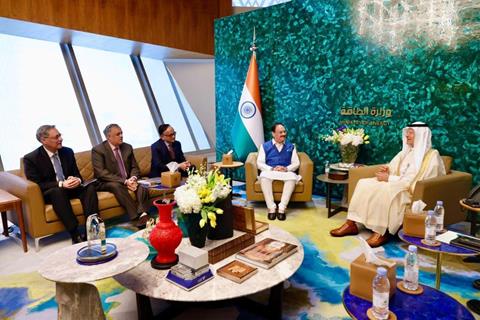JP Nadda’s Saudi Visit: A Strategic Boost to India’s Fertiliser and Health Security
Bilateral meetings took place to strengthen collaboration in the medical sector, healthcare services, pharmaceuticals, digital health solutions, and knowledge exchange.
The recent visit of Union Minister of Health and Family Welfare and Chemicals and Fertilisers, Shri J.P. Nadda, to the Kingdom of Saudi Arabia (July 11–13, 2025) marks a significant step in cementing India’s economic and strategic cooperation with one of its most crucial energy and resource partners. With long-term fertiliser supply agreements, joint task forces for future collaboration, and new dialogues in health and pharmaceuticals, this trip underscores India’s growing emphasis on economic resilience through global partnerships.
J.P. Nadda, to the Kingdom of Saudi Arabia (July 11–13, 2025) marks a significant step in cementing India’s economic and strategic cooperation with one of its most crucial energy and resource partners. With long-term fertiliser supply agreements, joint task forces for future collaboration, and new dialogues in health and pharmaceuticals, this trip underscores India’s growing emphasis on economic resilience through global partnerships.
At the core of the visit was a breakthrough in securing India’s fertiliser security. Long-term agreements were signed between Saudi mining and fertiliser giant Ma’aden and Indian firms—Indian Potash Limited (IPL), KRIBHCO, and CIL. The deal will raise India’s annual import of Diammonium Phosphate (DAP) from Saudi Arabia to 3.1 million metric tonnes (MT) starting FY 2025-26—nearly a 63% jump from the 1.9 million MT imported in 2024-25. This agreement has a five-year validity and includes a provision for extension, adding predictability and stability to India’s agri-input supply chain.
Fertiliser Security as a Strategic Imperative
Fertilisers, while often overshadowed by oil in diplomatic discussions, are an essential pillar of food security and economic stability for India. As one of the largest importers of DAP and Urea globally, India has often faced the dual challenges of supply shocks and price volatility. This long-term deal with Maaden provides India with a critical hedge against such disruptions.
What makes the agreement particularly strategic is its forward-looking component. Discussions between Shri Nadda and the Saudi Minister of Industry and Mineral Resources, Mr. Bandar bin Ibrahim Al Khorayef, explored avenues to expand this cooperation beyond DAP to include Urea and other key fertilisers. Even more significantly, both sides agreed to examine mutual investment opportunities, including possible Indian PSU investments in Saudi Arabia’s fertiliser sector. This move could deepen India’s role in global supply chains.
To operationalise these ambitions, a joint team has been formed, led by India’s Fertiliser Secretary and Saudi Arabia’s Vice Minister for Mining Affairs. This institutional mechanism signals a shift from transactional to strategic cooperation, where India is not just a buyer, but a potential partner in production and innovation.
Strengthening the Health and Pharma Corridor
Nadda’s role as Minister of Health and Family Welfare added another dimension to the bilateral agenda. In his meeting with H.E. Abdulaziz Al-Rumaih, Saudi Vice Minister of Health, discussions focused on deepening collaboration in pharmaceuticals, medical services, and digital health. This complements the bilateral Memorandum of Understanding on Health signed during Prime Minister Narendra Modi’s recent visit to the Kingdom.
Saudi Arabia, with its ambitious Vision 2030 plan, is looking to expand healthcare access, digitise services, and localise pharmaceutical manufacturing. India, already a global pharmaceutical powerhouse, is well-positioned to be a partner of choice. From supplying generic medicines to deploying AI-enabled diagnostics, India can play a central role in supporting the Kingdom’s health reforms.
Furthermore, the potential for knowledge exchange and capacity-building in public health between the two nations opens up a new frontier for bilateral ties. With India’s proven track record in telemedicine, affordable healthcare delivery, and vaccine production, these engagements hold real promise beyond commercial interests.
Geoeconomics in Play
Beyond sectoral cooperation, Shri Nadda’s meetings with key Saudi ministers, including His Royal Highness Prince Abdulaziz bin Salman Al Saud, also touched upon the broader economic relationship. Prince Abdulaziz, who co-chairs the Economy and Investment Committee under the India-Saudi Strategic Partnership Council, reaffirmed the Kingdom’s commitment to deepening ties with India across energy, petrochemicals, and investment.
This is geopolitically significant. As India pursues energy transition and seeks greater supply chain autonomy, Saudi Arabia offers both traditional strength in hydrocarbons and new opportunities in minerals and fertilisers. India, in turn, offers a vast market, a robust pharmaceutical base, and, increasingly, innovation in digital public infrastructure.
The dinner hosted by the Saudi India Business Council, along with the site visit to Maaden’s phosphate facility at Ras Al Khair, further underscored the growing appetite on both sides for collaboration, not just in trade, but also in co-development and co-investment.
A Template for Future Diplomacy
JP Nadda’s Saudi visit was not just about securing deals—it reflects India’s evolving diplomatic playbook. The focus is now squarely on strategic autonomy, economic resilience, and partnerships that deliver long-term dividends. By aligning resource security (fertilisers), economic ambition (investments), and public good (health cooperation), the visit has broadened the India-Saudi engagement in both scope and substance.
As India looks ahead to 2047, the centenary of its independence, such high-value, multi-sectoral partnerships will be crucial. The Maaden agreements are not merely trade transactions—they are a vote of confidence in India’s growing economic clout and a template for how diplomacy can directly fuel national development goals.
